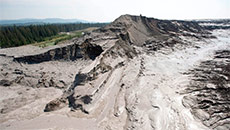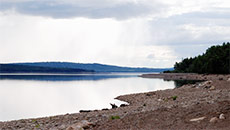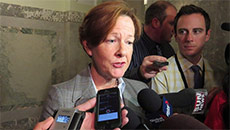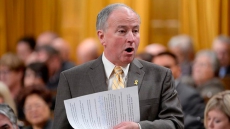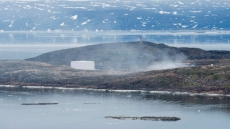OTTAWA - Stephen Harper expressed strong support for U.S. airstrikes in Iraq during a telephone conversation Tuesday with President Barack Obama.
The two leaders talked about the latest developments in the unfolding crisis, and during the conversation Harper expressed Canada's willingness to do more on the humanitarian aid front, said spokesman Jason MacDonald.
The pair agreed on the need to confront the terrorist threat posed by the al-Qaida splinter group known as the Islamic State of Iraq and the Levant, MacDonald noted.
The group has already swept across northern and eastern Iraq, occupying almost one-third of the country.
MacDonald said Harper indicated Canada is ready to offer additional help, and that Canadian officials will work with their counterparts to identify additional avenues for humanitarian relief.
On Sunday, the federal government said it would send $5 million in additional emergency supplies and humanitarian aid to Iraq, including food, medicine, cooking materials and blankets.
Royal Air Force Tornado jetfighters were dispatched to Cyprus, where Britain's Ministry of Defence says they are expected to support flights meant to deliver aid to refugees.
The fighters will also conduct reconnaissance ahead of further airdrops. The RAF has also sent a "small number" of CH-47 Chinook helicopters in case they are needed for relief operations.
MacDonald says Canada's assistance will be humanitarian only.
U.S. Secretary of State John Kerry insisted Tuesday that American combat forces will not re-enter Iraq, but that Washington is exploring more “political, economic and security options” as the country grapples with a political deadlock. Prime Minister Nouri al-Maliki was effectively deposed when the country's president asked a rival Shite candidate to form a government.

Obama, speaking in Chilmark, Mass., applauded the naming of Haider al-Ibadi as Iraq’s new prime minister-designate and characterized it as an important step towards bringing stability to the country.
Harper and Obama also shared the hope that a new, inclusive Iraqi government would be able to unite to counter the current crisis, MacDonald said.
But an address to the Iraqis people late Monday, al-Maliki denounced the naming of his successor as unconstitutional.
The political stalemate unfolded as thousands of civilians, mostly members of the Yazidi sect, remained trapped by ISIL militants on a mountain in northern Iraq.
The United Nations warned the refugees were in need of "life-saving assistance."
The Yazidi fled to the remote area 10 days ago after hardline fighters seized the town of Sinjar and reportedly massacred a number of men and abducted some of the women.
The last reported conversation between Harper and Obama was March 1 when the two leaders spoke about the unfolding crisis in Ukraine.
Since them, the U.S. president has repeatedly consulted other allies and G-7 leaders, including France, Britain and Germany.
The apparent lack of interaction may have something to do with the continued uncertainty around the Keystone XL pipeline, an issue that has put a strain on Canada-U.S. relations.
